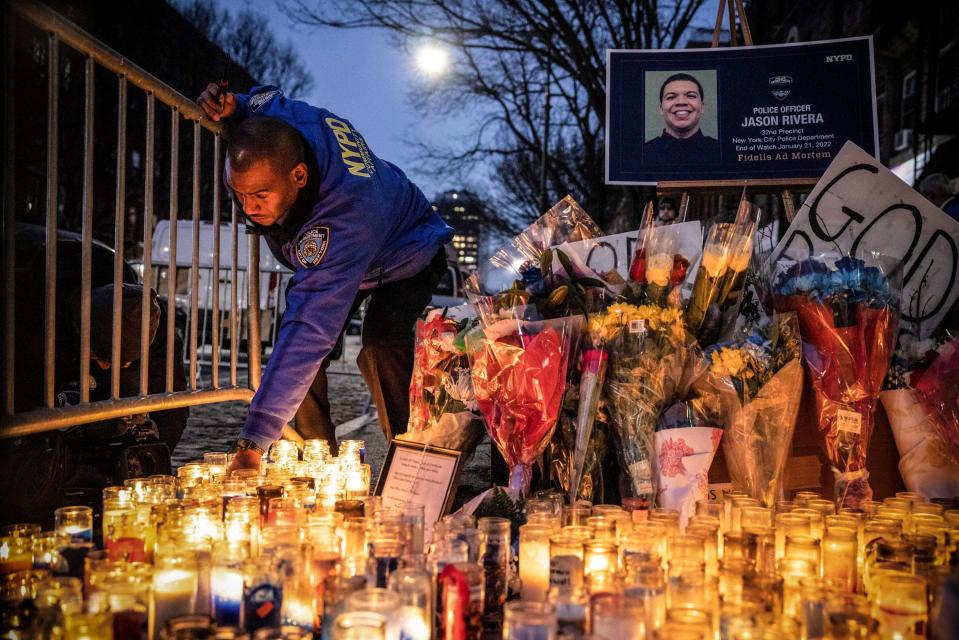Police attacked in at least 5 states in about a week. Are officers being targeted?
At least 10 law enforcement officers were shot or killed – most around major U.S. cities – in about a week, in what criminal justice reform advocates and a police union describe as a by-product of a national violent crime crisis.
Two officers died after a shooting in New York City on Jan. 21, two were shot near St. Louis on Wednesday, three were injured in Houston on Thursday and two law enforcement officers were shot in Milwaukee, each on different days. And on Friday, a Kentucky State Police trooper was wounded by gunfire.
Police union leaders quickly linked the violence with anti-police sentiment, one going so far as to say officers are being "hunted in the streets." The unions have long suggested an erosion of respect for police in their communities could endanger officers, especially after protests for racial justice in the wake of the 2020 murder of George Floyd often featured calls to defund major police departments.
But criminal justice experts told USA TODAY there's no evidence police officers are being targeted en masse. Rather, a documented rise in gun violence is making policing an inherently more dangerous job, they say.
'FINAL GIFT': Fallen NYPD officer saves 5 lives through organ donation
NO 'SURRENDER': Mayor Eric Adams lays out gun violence plan after NYPD officers killed
“The rise in police being shot by community members is coinciding with the overall rise in violent crime," said Howard Henderson, the founding director of the Center for Justice Research. The research program at Texas Southern University examines how to make the criminal justice system more equitable.
“Police happen to be some of the victims" in an ongoing “crime wave," Henderson said.

Several concerning spikes in violent crime data, particularly in big cities, have been blamed on a myriad of reasons. As FBI data showed U.S. homicides were dramatically up in 2020, blame for similar spikes around the country became a political debate, with explanations including fallout from the coronavirus pandemic, economic inequality, rising gun ownership and upheaval from protests over police killings.
Justin Nix, a criminal justice professor at the University of Nebraska Omaha said violence against police has been trending upward in recent years. But it closely follows an uptick in U.S. violence.
There's little disagreement here, Patrick Yoes, National President of the Fraternal Order of Police, said. More violent crime means increased danger for officers.
But Yoes also said some movements critical of law enforcement – such as those aimed at defunding police – have left many officers feeling dehumanized: "The trend that’s happening in this country is making their job less safe." It's a frightening, emotional situation for many officers, Yoes said.
FACT? CHECKED. Make sure you have the real story with the Checking the Facts newsletter.
Some experts have previously expressed similar concerns about anti-police sentiment: "Right now, we are seeing it all over the country, total disrespect of police officers," Maria "Maki" Haberfeld, a professor of police science at John Jay College of Criminal Justice in New York told the USA TODAY Network.
"To me, policing is one of the pillars of a democratic society. When people start attacking police, it is the end of democracy," Haberfeld said.
But it's too soon to tell whether the recent rash of high-profile incidents is the beginning of a new, upward trend, Nix said. Historical data shows violence against police often dramatically ebbs and flows month-by-month.
Nix, however, dismissed the notion that there is an ongoing, escalating "war on police." That's just "propaganda," Nix said.
Seemingly alarming statistics about an uptick in ambush attacks, for example, lack context, Nix wrote in an email. Ambushes may not be an unprovoked, targeted attack – they may happen in the normal course of dangerous police work, such as a search for a suspect who chooses to hide, then shoots officers.
Fortunately, violence against officers remains relatively rare, retired Seattle police chief Norm Stamper said. Stamper worked in policing for over three decades in San Diego and Seattle and now is associated with Law Enforcement Action Partnership, a nonprofit group working to improve the criminal justice system.
Federal data cited by Stamper shows dozens of professions that are more deadly than being a police officer: “Policing is less dangerous than mining, agriculture, forestry, fishing,” he said.
Stamper worries losing that perspective is dangerous for officers, especially if concerns about officer safety become paranoia.
“A scared cop is a dangerous cop,” Stamper said.
But those statistics are little comfort to officers who are putting themselves in harm's way on a daily basis, Stamper acknowledged.
“There is something different about a police officer killed in the line of duty,” Stamper said.
Contributing: Josh Dulaney, The Oklahoman; The Associated Press
This article originally appeared on USA TODAY: Police attacked in 5 states in about a week amid violent crime spike

